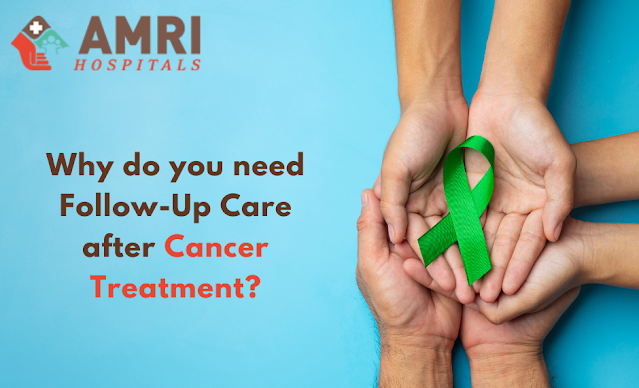Why do you need Follow-Up Care after Cancer Treatment?
Cancer is a collection of further than 100 diseases. Almost any part of the body can get it. Most of the time, cells tend to die when they become old or get damaged. When you finish cancer treatment, your care doesn't stop there.
Your medical team will continue to see you for what is called "follow-up care." In addition to monitoring for recurrence and managing treatment-related side effects, the best cancer doctor in Kolkata will also ensure your overall health.
Preparing for Your
After-Cancer-Treatment Care:
Follow-up care is
something that you and your healthcare team plan together. Your plan will serve
as a roadmap for your health in the years after therapy. It will likely consist
of routine check-ups with the best cancer doctor in Kolkata.
Medical recommendations
for your particular cancer type and treatment stage form the basis of a
post-treatment care plan. When determining a course of treatment for you after
your initial visit, your doctor will bear in mind any special considerations
you may have.
After receiving therapy,
it is important to have a plan in place for how you will transition back into
your daily life. Access to medical resources can improve one's mental and
physical health.
Keeping an Eye Out for a Cancer
Comeback or a Second Malignancy:
Monitoring for cancer
symptoms is a vital aspect of aftercare. If cancer returns after treatment,
your doctor will do a recurrence check. When only a handful of cancer cells
remain undetected in the body, the disease might recur. These cells can
multiply to the point that they are detected by diagnostic means or cause
noticeable symptoms.
The likelihood of cancer
returning is affected by the sort of cancer you initially had, among other
things. This factor also impacts the timing and location of cancer's return.
The return of your cancer is something no doctor can predict with absolute
certainty.
In your follow-up appointments at a cancer hospital in Kolkata, your doctor will ask you detailed questions about your health during your follow-up appointments.
You could also undergo imaging or blood testing to investigate the issue further. The results of the test are contingent on several variables.
- Initial
cancer diagnosis details, including tumor type and stage
- Your
care thus far
- Whether or not testing has been shown to improve health or extend the life span
Your doctor may highlight
certain indicators of cancer's return. Research the risks of developing second cancer.
How do People Deal With the Long-Term Repercussions of Cancer Treatment?
- If the
patient has undergone radiation therapy to the head, neck, or throat, they
should have their thyroid gland checked annually.
- Tests of
lung function after bleomycin (Blenoxane) treatment or a bone marrow (stem
cell) transplant. A pulmonary function test can obtain measurements of lung
capacity and respiratory rate.
- Regular
electrocardiograms (EKG) should be performed if chest radiation therapy is
administered. Because some chemotherapy medicines can alter heart function,
EKGs are employed in these cases.
- If a
younger patient has undergone radiation therapy to the chest, she should
undergo regular mammograms.
- Checks in imaging studies or blood work can detect cancer recurrences. Techniques such as X-rays and CT scans fall into this category.
Conclusion
Your primary care physician
in a cancer hospital in Kolkata will note down any information you can
provide them regarding the therapies you've received and any recommendations for
subsequent care. The completed forms will assist in monitoring your progress
and ensuring proper treatment is being administered.
Also, Read this: The Top 5 Vitamins & Supplements for Healthy Eyes




Comments
Post a Comment